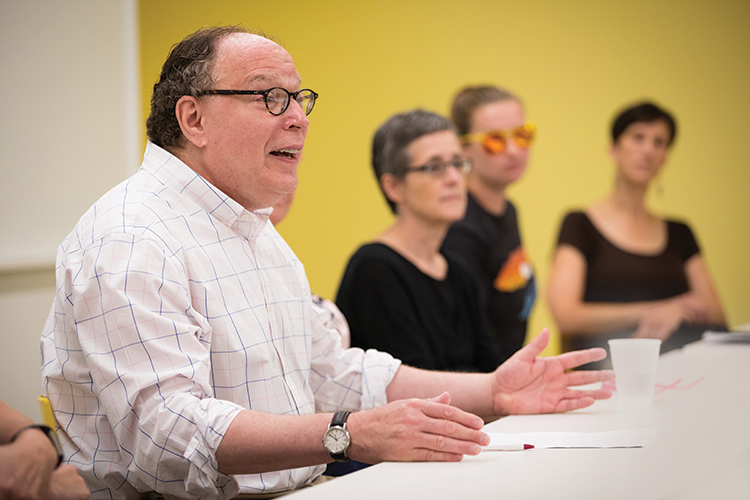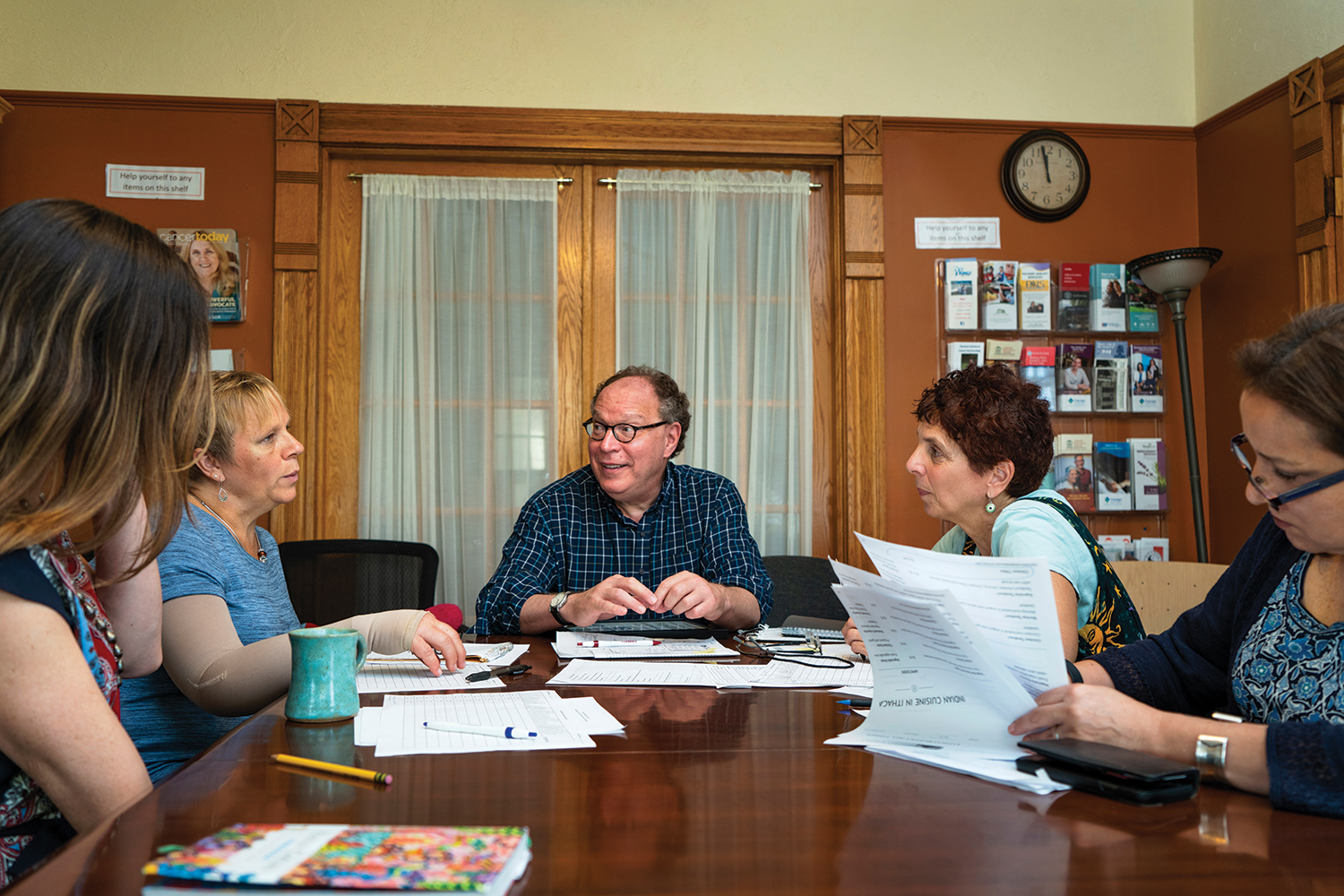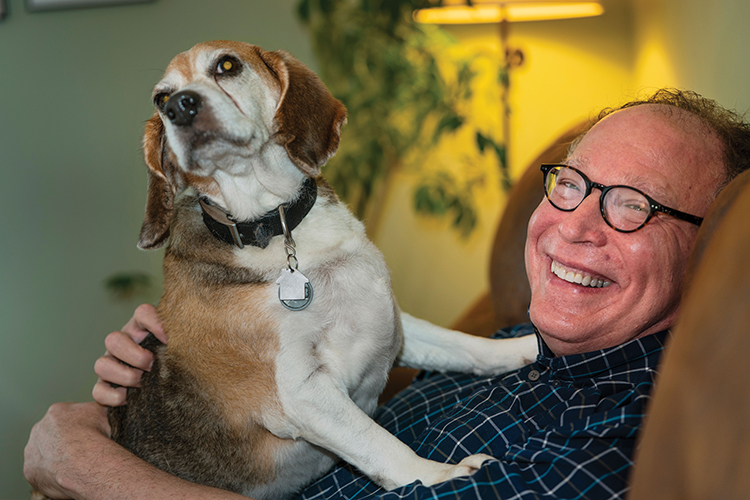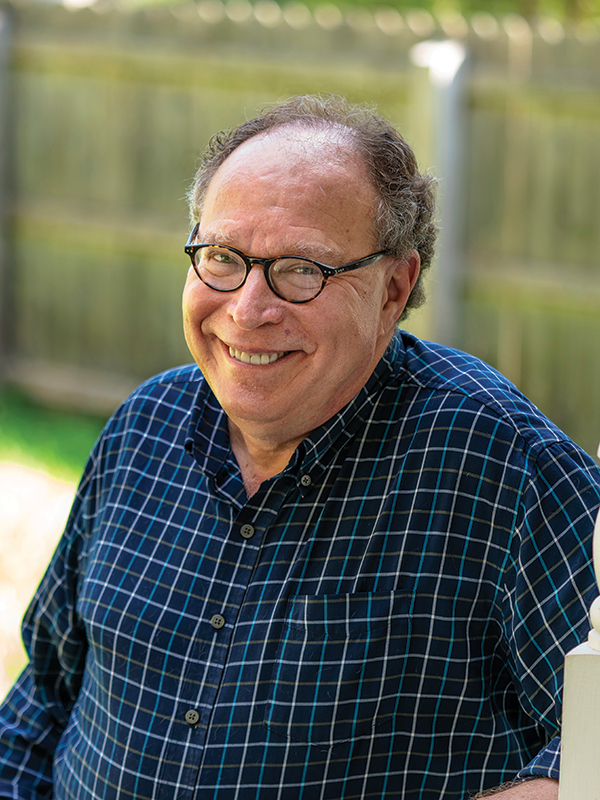BOB RITER HAS NEVER BEEN ONE TO SEEK OUT THE SPOTLIGHT. He is most comfortable sitting on his couch with a cup of coffee, reading the local newspaper. He enjoys watching rowers glide by on Cayuga Inlet, a stone’s throw from his quiet Ithaca, New York, home.
“I’m actually most comfortable by myself,” Riter, 62, says. “I like to be a lump on the couch with a good book, and my dog ignoring me to the side.”
Breast Cancer in Men
Breast cancer in men is rare, making up just a little under 1 percent of new breast cancer cases each year.
In 2018, about 266,120 new cases of invasive breast cancer will be diagnosed among women, while 2,550 cases will be diagnosed in men, according to the American Cancer Society. A man’s lifetime risk of developing breast cancer is about 1 in 833, compared with 1 in 8 for women, although men tend to have higher death rates from the disease than women do.
Riter’s desire to avoid the limelight may seem at odds with his former role as executive director of a cancer patient advocacy organization, but an ability to make connections and offer his support, without overstepping or offending, made him a natural fit for the job. He came to the role via an unlikely path: In 1996, Riter was one of an estimated 1,400 men diagnosed with breast cancer in the U.S. that year.
“It was a big surprise to have cancer,” says Riter, who was 40 years old at the time. “But as a man, to have breast cancer was doubly surprising. I think we all have a mental list of things to worry about, and breast cancer wasn’t on my list.”
Riter, then an assistant professor of health services administration at Ithaca College, wanted to learn what he could about his diagnosis. “I always feel better if I understand what’s going on,” he says. On the day he learned he had cancer, he stopped by the Ithaca Breast Cancer Alliance (IBCA), a patient support organization started in 1994. The volunteer he spoke with promised to find information specific to breast cancer in men and gave Riter reading material about what would later be his treatment—mastectomy and chemotherapy, followed by tamoxifen.
After completing his treatments, Riter returned to IBCA for a support group to help him deal with “post-treatment blahs,” he says. “The time after treatment is isolating when there are no more doctors’ appointments or people checking in on you,” Riter says. Eventually, he began volunteering with the organization, despite being the only male breast cancer survivor involved. In 2000, he became the associate director. The IBCA broadened its scope in 2007 to serve people with all cancers and changed its name to the Cancer Resource Center of the Finger Lakes to reflect that mission. Three years after that, Riter became the executive director—a role he would keep for seven years until his retirement in 2017.

Bob Riter makes a point during a panel discussion held in October 2018 at Cornell University in Ithaca, New York. The discussion was part of an ongoing seminar series that connects cancer researchers in training with people affected by cancer. Photo by Gary Hodges
“I think being a man with breast cancer made it easy for me to connect with women with cancer,” he says, looking back at his 17 years with the organization. “And, of course, I could connect with men with all types of cancer.”
Noticeably absent from Riter’s self-reflection is any mention of the traits that those closest to him laud: a keen intelligence, a rare knack for finding commonality in the most unlikely places and an ability to see beyond differences to build bridges. He does all this while shining the spotlight on others.
“He doesn’t have a big ego,” says his older sister, Susan Riter. “To be able to do that kind of work, you have to be able to let other people shine without constantly calling attention to yourself. That’s something Bob is particularly good at.”
The Spirit of Collaboration
Although Riter describes his childhood in Huntington, West Virginia, as joyful and uneventful, a traumatic event that occurred early in his life may have set him on a path of helping others. When he was 4 years old, Riter suffered third-degree burns on his leg after hot debris escaped from a trash fire. He needed a skin graft that extended from his knee to his ankle, and staff at the hospital helped him learn to walk again. “I saw the ability to help people, and I think that was a core theme for me,” says Riter.
After graduating from Oberlin College in Ohio, Riter earned a master’s degree in health care administration from the University of Michigan in 1980 and started working with the elderly. He took on administrative roles at several hospitals and nursing homes, but what he really wanted to do was teach. After completing coursework at the University of Michigan for his doctorate in health services organization, he accepted an assistant professor position at Ithaca College in 1994, with plans to eventually finish his dissertation.

Bob Riter meets with former colleagues at the Cancer Resource Center of the Finger Lakes in Ithaca. Photo by Gary Hodges
Then, in the summer of 1996, Riter felt a hard lump the size of an eraser on a pencil behind his left nipple. Weeks later, he noticed the nipple was bleeding. He saw his primary care doctor, who referred him to a surgeon. After a fine-needle biopsy and an excisional biopsy of his lump, Riter had a mastectomy. As part of the procedure, his axillary lymph nodes were biopsied, which revealed that he had stage II breast cancer.
After his mastectomy, Riter was getting ready to start another semester of teaching. Worried that his students might be alarmed if he started losing his hair from chemotherapy, he decided to share details of his diagnosis and treatment.
“I found that a lot of the students had known someone with cancer, but they never felt comfortable asking that person questions about their cancer, so they asked me, and I liked that,” he says. “I like taking away the mystery of cancer.”
While teaching full time, Riter completed chemotherapy in six months and started taking tamoxifen, a treatment that can reduce the risk of breast cancer recurrence. The recommended length of treatment at the time was five years, but after three months and with his oncologist’s approval, he stopped taking tamoxifen because of its side effects.
In the summer of 1997, Riter submitted a column to Newsweek magazine that described in a humorous and down-to-earth way what it was like to be a man with breast cancer. “I remember right before that column came out, I thought, ‘Should I be telling all these people that I have breast cancer? Will I become known as this guy with breast cancer—this real oddball?’”
After the article appeared, however, Riter received letters of encouragement from other men who had been diagnosed with breast cancer. “It made me feel good and I just felt supported,” he says.
A Broader Approach
Since being diagnosed, Riter has shifted from seeking support to providing it, what he considers the normal development path for a patient advocate. “I think people focus on their own cancer initially. But then that grows to ‘What can I do?’” he says.
Prior to IBCA’s name change to the Cancer Resource Center of the Finger Lakes, Riter was well on his way to providing support to people with various types of cancer as the organization’s associate director. In 2005, he applied for and received a grant from the New York State Department of Health that put volunteers, most of whom were cancer survivors, in the waiting rooms of chemotherapy and radiation suites at the Cayuga Medical Center in Ithaca. To this day, volunteers from the Cancer Resource Center greet patients coming for treatments and provide snacks, coffee, support and conversation.

Bob Riter enjoys the company of his beagle, Holly, in his Ithaca, New York, home. Photo by Gary Hodges
Over the years, volunteers have shared information about support groups with patients and taken notes for patients who had no one with them for medical appointments, says Charles Garbo, an oncologist at Cayuga Medical Center who treated Riter. “They’re right in our office every day helping us out.”
Skip Hewitt, a three-time cancer survivor, was a long-serving volunteer at the Cayuga Medical Center when he was diagnosed with his second cancer, bladder cancer, in 2009. He vividly remembers being in the waiting area at the medical center prior to getting pre-admission testing for his emergency surgery, which was scheduled for the next day.
“Bob walked in,” Hewitt says of Riter. “It was great timing. He calmed me down, like he does with everyone. He just listens and provides information, but he is never in your face. With Bob, you can just talk to him.”
An Information Sharer

Bob Riter is proud of making connections with researchers, patients and patient advocates. Photo by Gary Hodges
In 1999, Holly Anderson, who was diagnosed with stage III breast cancer at age 40, met Riter through an email-based discussion group that included patient advocates, survivors and physicians. Instantly, Anderson, who is now the executive director of the Breast Cancer Coalition of Rochester in New York, recognized Riter’s mastery of language, even via email. He wrote clearly and concisely, and he elegantly conveyed the experience of having cancer. The two became collaborators, even though there was some geographic overlap in their organizations’ patient reach. “Because of his willingness to be really in deep with the survivor community, he didn’t see us as competitors, especially as we grew and sprawled out,” she says. “We’ve had a wonderful exchange of referrals.”
Riter is the go-to person for Anderson when a man with breast cancer is seeking support. The same goes for any person living in the Ithaca area who belongs to a marginalized population, including gay and transgender people with cancer. “Anybody who has a difficult story, anybody who feels vulnerable or fragile, I would entrust to Bob’s care just because of the tenderness and his ability to connect,” Anderson says.
Riter coordinated monthly classes where doctoral students in the sciences could describe their cancer research to survivors, and survivors could share their experiences with the researchers. The program is now offered as a graduate certificate program in public communications for researchers, and it has expanded to include discussions about the economics of cancer treatment and financial toxicity.
Web-Exclusive Content
Learn more about Bob Riter in this online video or read his column, which includes resources for advocates to enrich their skills.
While Riter was serving as a patient advocate on Defense Department review panels for breast cancer research grants, he sensed a division between patient advocates and researchers. “The advocates were afraid of scientists, and the scientists didn’t have much exposure to advocates,” he says. His thoughts went to Cornell University, an Ivy League school in Ithaca that educates scientists in various disciplines. “I thought we should get all of us together while the scientists are still in training.”
“It can be very impactful in the sense that scientists in training have a personal connection with patients that they meet through this,” says Bob Weiss, who helped Riter start the program and is the associate dean for research and graduate education and a professor of molecular genetics in the Cornell University College of Veterinary Medicine. “Many have come to the realization that papers and fellowships and awards are great, but if they could actually impact the life of somebody who’s affected by this disease, that’s so much more rewarding.”
In October 2017, Riter stepped down from his role as the executive director of the Cancer Resource Center—a decision motivated by a health issue unrelated to his cancer history. But even in retirement, he stays busy. He continues to volunteer with the Cancer Resource Center, and he meets other male cancer survivors every Friday for the breakfast club, a support group for men that he started years ago. He also maintains the collaboration with Cornell and has accepted a part-time role at the university’s Physical Sciences Oncology Center to find other ways to bring cancer survivors and researchers together, an effort funded through the National Cancer Institute.
“I’m really proud of making connections between people with all types of cancer, researchers and patients, and clinicians and patients,” says Riter. “I love building bridges and helping people speak to each other.”
Twenty-one years ago, in his Newsweek column, Riter wondered whether his investment strategy for retirement planning should change, given that he might not live very long. He didn’t know it then, but his own brush with mortality would end up being a lifeline for him.
“Ironically, in a sense, if I hadn’t been diagnosed with cancer, I’d probably still be teaching,” says Riter. “I’m really quite happy with how my career changed. I discovered this mission that’s been a perfect fit for me.”
Cancer Today magazine is free to cancer patients, survivors and caregivers who live in the U.S. Subscribe here to receive four issues per year.





